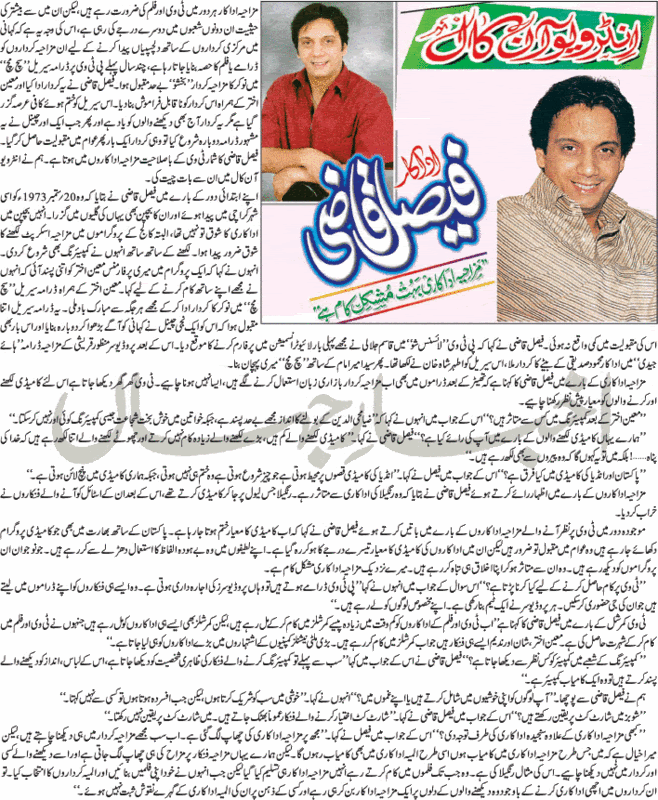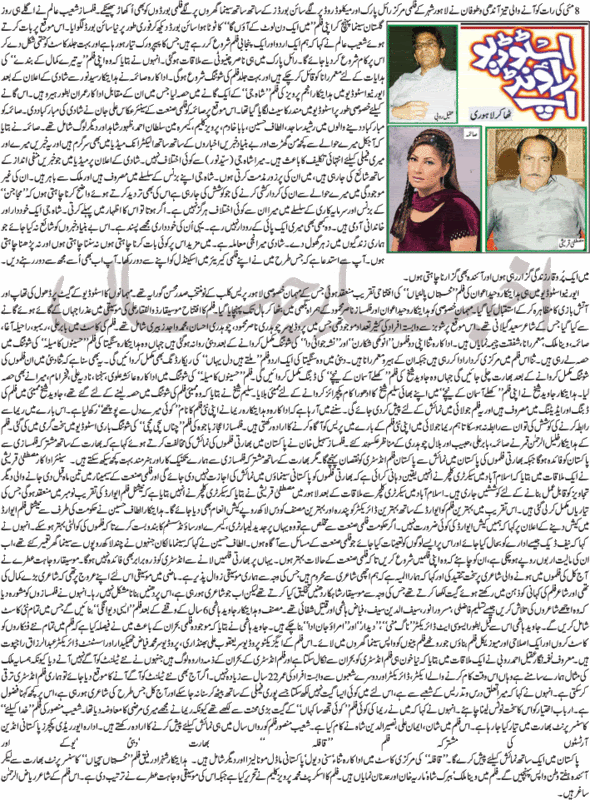| Noori | ||
| Noori is a leading name in Pakistan's music industry. Ali Noor (the lead vocalist), Ali Hamza (bassist), and Gumby (the drummer), have been rocking the music scene in Pakistan for many years. Recently, we met with Noori in Lahore for an exclusive interview. Both Ali Noor and Ali Hamza are delightful young men, thoroughly cultured and very impressive not just for their musical talent but their attitude, values, and aspirations. Below is a mish-mash of our conversation with them, sprinkled with some basics on the band. For more information on Noori, please visit www.nooriworld.net and make it a frequent stop, because you will find a lot of released and unreleased material there, in addition to the latest news and upcoming events. | Ali Hamza, Ali Noor, and Gumby | |
| The Birth of Noori... | ||
| Noori's music was conceived at a time when adopting music as a profession was quite unthinkable for most people. Getting a "proper education" and doing something "real" was a major social expectation because neither musical education nor musical careers had achieved the kind of social recognition and respect they are getting now. Still, inspired by the way he went through life, Ali Noor had conceived all three albums (two of which are out and one still to come) many years ago. "There's a personal formative experience that lends a lot of the thematic character to our music. I studied in an almost Urdu Medium school, Crescent Model, which was primarily middle-class. Now things have really changed, but at that time, schools were divided across the Matriculation and Senior Cambridge lines, and Crescent Model was very much like a mainstream middle class private school with good education but no option other than the Pakistani Matriculation system. I was debating going abroad for my studies and decided to do my Senior Cambridge, for which I transferred to another school called Bloomfield Hall. Now that was another extreme. It was a completely different culture and for me, it was a culture-shock. At Crescent Model I used to curse the backwardness of the students, and at Bloomfield Hall I was shocked by the priorities and attitudes of the so-called Senior Cambridge elite. I couldn't reconcile with the reality of the advanced, upper-middle class if you will. They were all engrossed in their own acquired accents and materialistic hedonism. It was the same theme as Peeli Patti and Raja Jani – I felt as though they were all living in their own, very separate world. That's where I first got inspired and decided that I wanted to convey my feelings through music," explains Ali Noor. | ||
| Noori's Music… | ||
| Noori's music does not belong to any particular genre – they are a self-styled pop act, which inherently allows them to dabble in rock, soft rock, and eastern tunes and rhythms. The most interesting thing about Noori's music is the lyrics. Clearly, Noori's music isn't mainstream pop. It isn't commercial in the real sense of the word. "Most of the conceptualization was done over seven-eight years. A 3rd album has also been planned out. We used to read a lot of Manto and Ghulam Abbas. We were very inspired by their writing, and a lot of the issues that we feel are quite similar and extensions of the issues that they wrote about." Said Ali Noor about their music. "Our first album was a based on a very simple issue: if you have to achieve anything in life, you've got to learn the hard way and you have to put in a lot of hard work. You have to find efficient and effective ways of putting in intelligent hard work to get somewhere. It was an optimistic album." The Second Album: Peeli Patti Aur Raja Jani Kee Gol Duniya… "The second album is an extension of the first album. It's about what happens if you don't work hard," says Ali Noor. "We felt that the reason why you wouldn't work hard is when you become indifferent and insensitive to the requirements of what you do. You start caring less and become unintelligent. And as you become unintelligent, you only try to do things the way they are done normally. You start to blindly follow the norms. That nurtures a very serious indifference, and eventually, you stop caring about the actual dynamics of your existence. This indifference leads to a non-existence, where you end up slowly getting wasted." | ||
| "Peeli Patti is a female and Raja Jani is a male. Basically, these are two tobacco brands. We've used their names because they have their own characteristics. They are both too high on life (at the height of indifference and selfishness). As a consequence of that, everything they do and see is from their own perspective. Their world is not round. When they get a very small glimpse of the real world, they realize that actually the world is round. And they are mocked by everyone about their surprise at the world being round. That's when they reflect on the disaster that is their life, and how far removed they are from the real world." Talking of the one song, Kuttay (dogs), Ali Noor had this to say: "It was actually a song that almost didn't make it to the album. Basically, I (Ali Noor) had composed this piece, very heavy metal. I liked the music and asked Ali Hamza to write some lyrics to go with it. Now, due to the nature of the music, which was really loud, with lots of noise, Ali Hamza decided to write the lyrics in Punjabi. As we know, Punjabi is much better at loud, blunt expression than Urdu or English. It was out on the internet as well and people actually quite liked it. So after much deliberation, and almost not including the song, we finally decided to include it." | ||
| The Response to Noori's Music… | ||
| Noori has become a huge name with serious fans who don't just want hip swaying, head banging sound, but music which resonates with their own lives. There's nothing lacking in Noori's sound either…their live performances are as thrilling as any other act. Yet, the average Noori fan is likely to have somewhat of a more "sophisticated" taste in music…the kind that goes beyond being able to dance to a tune. And Noori is serious about maintaining that image. "This [second] album has a certain background. It was released after a hibernating period, following the release of our first album, which was a very big success. We had sort of become inundated with many commercial activities, like media campaigns and all. In a way, we took a break from producing music. So the whole | ||
| purpose behind the second album was to sort of rectify the image that we had created, being one of a slightly non-serious, extremely commercial act. It was produced to create respect and critical acclaim amongst our fans and followers. In that way we have been very successful. We have managed to get the right kind of reviews, and we've managed to successfully alter the image that people had formed about Noori, to the kind of image which we want them to have of us. People were quite excited about the release and it's been on the charts for over four or five months now. We still have a lot of promotional work to do, like concerts and media campaigns, which came to a standstill due to the earthquake. But overall, yes, we've got the response we wanted." | ||
| Why Ali Noor is called "Tariq Bin Ziyad" by his friends… | ||
| Ali Noor and Ali Hamza have recently returned to Lahore from Abbottabad, a city up north of Pindi. They had moved there in a rare, uncharacteristic move for most people their age, let alone celebrities the size of Noori. "The identification of a problem is the most important thing. We realized that when we became celebrities, got famous, and got a chance to make money. We were living in Karachi which is the hub of everything; I was constantly getting caught up in parties, media events, fashion shows, I don't even remember. I was not getting a chance to focus on my music, reading, and things that I enjoy doing in life. Then I understood what is happening not just to me but a lot of our artists and musicians. There is no further addition or evolution, and because people can get really caught up in these PR activities, they can stagnate." Having identified the problem with the nature of stardom, came the reflection. "We don't need it. We take out an album, if people like it, great; if not, maybe they'll like the next one. Why should we waste 20-25 days a month in useless activities and not getting anything out of it. The fans don't care about seeing our faces at every event. They want to hear our music and that's what we need to focus on!" | ||
| And from the reflection, resulted the band's relocation all the way to Abbottabad. "It took us five minutes to decide that we didn't want to live there [Karachi]. We moved not just to Lahore or Islamabad, but all the way to Abbottabad. Some of my friends call me Tariq-bin-Zyad. But I feel you have to have that ability to burn your boats and do things differently. You have to constantly nurture this sense of serious reflection and a constant check of whether things are going right or not. And if you can't rectify things completely, you can at least take a few steps. Pakistanis are very sensitive people – they can see through the layers of a lot of things. They are not that basic, which makes them the way they are. It's their exclusive nature. So we have this ability to read between the lines but we don't know how to act on it." | ||
| Noori Moves Back to Lahore after the Earthquake… | ||
| Following the October 8th earthquake, Noori moved back to Lahore. The house they were renting in Abbottabad belonged to a gentleman whose relatives had lost their home in the earthquake. Noori vacated their house and moved back to Lahore as quickly as they had moved to Abbottabad. Speaking of the earthquake, both Ali Noor and Ali Hamza were earnestly distraught. "It's a huge disaster – beyond human scale to understand. People reacted immediately and went to help, support in any way they could. I just hope that it can be sustained. The media stories are going to fade in a few months. But reconstruction is a five year or longer project. I just hope that the energy is not lost by then," says Ali Noor. Noori hasn't done any concerts or fundraisers throughout the aftermath of the earthquake. "We have a problem with media, especially people in the celebrity circle, who have utilized this opportunity for self-promotion. We were probably the only celebrities who were living there but as a matter of policy, we stayed completely away from it. Even if we do want | ||
| to do something about it, the second that media comes in, it becomes this commercial thing. The celebrities shouldn't become larger than the disaster. The public needs to have its own conscience to help in these situations. If you are not sensitive enough to feel the impact of the disaster yourself then that's really sad and very wrong. We believe in "neki kar darya mein daal." If you do something good, the world does not need to know about it. It's not a systemized thing in Pakistan like in the West, where celebrities have their individual causes and they work to inspire people. There's a missing link when a celebrity is involved with this work – you can't just use the name of the person as a tool." | ||
| Noori's Views on Copyrights and Pakistan's Music Industry… | ||
| Every musician we have spoken with has confirmed the lack of a copyrights structure in Pakistan. We asked Ali Noor what he felt about it, especially given his legal background. "There is no copyrights structure in Pakistan. Music contracts are not royalty based and we don't make any money from the sale of CDs. It's not an entirely bad thing. Like when we first came out with our music, we didn't have to jump through all the hoops that you'd have to in the West. Over there it's a long process, before somebody actually gets a break, but over here it's all very informal. You can put your songs on the Internet, and the minute you get the buzz going, a record company can sign you up." |
| |
| And finally, on Ali Noor's Marriage… | ||
| Mandana Zaidi and Ali Noor were married late 2005. "It was very much a love marriage. Basically, it was like we just couldn't marry anyone else, because we had been friends for so long. Mandana has been an integral part of Noori for as long as we can remember. We defied all cultural and social norms, antagonized and frustrated our parents, with our "we are working on this album all night and Mandana is staying over" routine. And truly, we were working. We just really understand each other, we care about the same things, and we'd spent such a huge and significant part of our lives together that there was no question about marrying anyone else. So now it's all official and Mandana continues to look out for Noori's management, marketing, and production." For more information about Noori's music, their past performances, and upcoming releases, please visit www.nooriworld.net |















comment:
p_commentcount